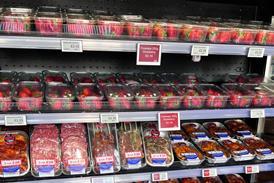THERE IS NO DOUBT THAT 2003 saw the start of the biggest change in ownership of Britain’s forecourts to have been seen in decades. After years of seeing the oilers increase their share of non-hyper sites, the combination of wholesale site closures and disposals should herald the re-birth of the independent dealer.
WHAT HAS BEEN MOST INTERESTING is that, despite the huge number of sites up for grabs, there appears to be no shortage of buyers. So if the oilers are wanting to get out of site ownership but dealers are happy to pile in which camp will be the winner and which the loser? Or can this be one of those rare win-win situations?
FIRSTLY WE NEED TO LOOK for the reason why the oil companies want out. Now it could be that they are looking 20 years down the line and seeing demand for petrol falling off a cliff, either due to restrictions on car use or a change to cars powered by other sources. It would then make sense to sell their real estate now before us plebs realise what is going to happen. I really hope that it is more a case that, for large areas of the country, they cannot see a market where the margin between Platts and pump is going to rise much above 3p. Rather than invest heavily in shops and other facilities, neither of which they have demonstrated much expertise in operation, they’ve decided to shrink their capital base and rely on a wholesale margin for their return on capital.
SO ARE THEY RIGHT? The reason up to now for low margins has been the hypers, and in some respects it is hard to see why they should change a winning formula. Despite planning restrictions their site numbers are still rising and the increased competition between them should keep prices depressed. On the other hand they are faced with the same cost pressures as the rest of us, albeit that they have much greater volumes over which to spread these extra costs. One hyper in my area has stopped manning their pumps from midnight to 6am – obviously a cost-driven decision – and some of the hyper forecourts are looking decidedly shabby and starved of investment.
I’VE ALWAYS FELT IT was only the presence of the oilers that had stopped the independent dealer suffering the same fate as the butchers, greengrocers, fishmongers etc. Now I’m not so sure. They suffered because the hypers offered better prices, bigger ranges of product and increased convenience. Our sites are more convenient, offer an identical range of fuel products and the consumer doesn’t always buy just on price. Perhaps if there were no oil company sites trying to match or beat the hypers (are you listening Shell, you plonkers) we would see some increase in overall margins – there are many examples of competing hypers keeping prices relatively healthy provided
no-one else in the area decides to make waves.
THERE IS ALSO THE QUESTION of what sort of deals the oil companies will be offering the hypers once they are purely wholesalers. In theory, when they had a retail estate to protect, you would have thought that they would have added a bigger premium over Platts than they would need as pure wholesalers. Will they still be as desperate for the volume as before? While the pressure to keep refinery capacity up will still remain, will someone eventually decide that it’s time the refineries made a decent return on capital? And with North Sea oil volumes declining is there really a need for so much UK-based refining capacity?
AS THE REAL ESTATE IS SOLD OFF it also means the decision on whether to continue operating in the UK can be based purely on return on capital. And it is this same removal of the barriers to exit that might yet see a further twist in our market – one man’s barrier to exit is another man’s barrier to entry!! The current Platts deals being offered by the oilers are stuffed full of premia, adjustments for low, mid or high CIF and extras for credit cards, promotions and pump maintenance. Plenty of scope for the arrival into the UK of a highly efficient, no frills wholesaler.
























No comments yet